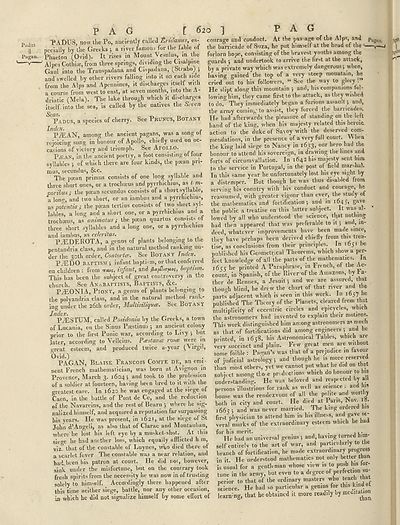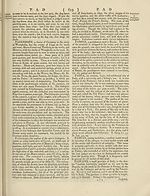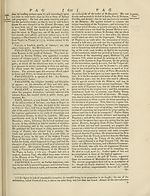Encyclopaedia Britannica > Volume 15, NIC-PAR
(696) Page 620
Download files
Complete book:
Individual page:
Thumbnail gallery: Grid view | List view

PililllS
II
Pagan.
PAG f 620 ]
TADUS, now the Po, anciently called tridanus, es- courage and conduct,
peciaily by the Greeks •, a river famous for the fable of
Phaeton (Ovid). It rises in Mount Vcsulus, in the
' Alpes Cothise, from three springs, dividing the Cisalpine
Gaul into the Transpadana and Cispadana, (Strabo) j
and swelled by other rivers falling into it on each side
from the Alps and Apennines, it discharges itsell with
a course from west to east, at seven months, into the A-
driatic (Mela). The lake through which it discharges
itself into the sea, is called by the natives the Seven
& Padus, a species of cherry. See Prunus, Botany
Index. c
P/EAN, among the ancient pagans, was a song ot
rejoicing sung in honour of Apollo, chiefly used on oc¬
casions of victory and triumph. See Apollo.
PiEAN, in the ancient poetry, a foot consisting of four
syllables j of which there are lour kinds, the psean pri¬
mus, secundus, &c.
The prean primus consists of one long syllable and
three short ones, or a trochseus and pyi rhichius, as t m-
poribus ; the paean secundus consists ol a short syllable,
a long, and two short, or an iambus and a pyrrhichius,
as poicnlia ; the pecan tertius consists of two short syl¬
lables, a long and a short one, or a pyrrhichius and a
trocheeus, as animatus; the paean quartus consists^of
three short syllables and a long one, or a pyrrhichius
and iambus, as celeritas.
PiEDEROTA, a genus of plants belonging to the
pentandria class, and in the natural method ranking un¬
der the 30th order, Contortce. See Botany Index.
PiEDO BAPTISM *, infant baptism, or that conferred
on children : from waif, infant, and baptism.
This has been the subject of great controversy in the
church. See Anabaptists, Baptists, &c.
PyEONIA, PiONY, a genus of plants belonging to
the polyandria class, and in the natural method rank¬
ing under the 26th order, Multisiliquee. See Botany
Index.
PiESTUM, called Posidonia by the Greeks, a town
of Lucania, on the Sinus Paestinus •, an ancient colony
prior to the first Punic war, according to Livy ; but
later, according to Velleius. Pcestanez rosee were in
great esteem, and produced twice a-year (Virgil,
Ovid.)
PAGAN, Blaise Francois Comte de, an emi¬
nent French mathematician, was born at Avignon in
Provence, March 3. 1604’, and took to the profession
of a soldier at fourteen, having been bred to it with the
greatest care. In 1620 he was engaged at the siege of
Caen, in the battle of Pont de Ce, and the reduction
of the Navareins, and the rest of Bearn *, where he sig¬
nalized himself, and acquired a reputation far surpassing
his years. He was present, in 1621, at the siege ol St
John d’Angeli, as also that of Clarac and Montauhan,
where'he lost his left eye by a musket-shot. At this
sico-e he had another loss, which equally afflicted h m,
-viz^ that of the constable of Luynes, who died there ot
a scarlet fever The constable was a near relation, and
had been his patron at court. He did not, however,
sink under the misfortune, but on the contrary took
fresh spirits from the necessity he was now in of trusting
solely to himself. Accordingly there happened after
this time neither siege, battle, nor any other occasion,
in which he did not signalize himself by some effort of
PAG
6 At the pas- age of the Alps and Pa
the barricade of Suza, he put himself at the head of the <
forlorn hope, consisting of the bravest youths among the
guards ; and undertook to arrive the first at the attack,
by a private way which was extremely dangerous •, when,
having gained the top of a very steep mountain, he
cried out to his followers, “ See the way to glory I”
He slipt along this mountain ; and, his companions fol¬
lowing him, they came first to the attack, as they wished
to do." They immediately began a furious assault; and,
the army coming to assist, they forced the barricades.
He had afterwards the pleasure of standing on the left
band of the king, when his majesty related this heroic
action to the duke of Savoy with the deserved com¬
mendations, in the presence of a very full court. M hen
the king laid siege to Nancy in 1633, our hero had the
honour to attend his sovereign, in drawing the lines and
forts of circumvallation. In 1642 his majesty sent him
to the service in Portugal, in the post ot field marshal.
In this same year he unfortunately lost his eye sight by
a distemper. But though he was thus disabled from
serving his country with his conduct and courage, he
reassumed, with greater vigour than ever, the stm.y of
the mathematics and fortification 5 and in 1645, gave
the public a treatise on this latter subject. It was ai-
lorved by all who understood the science, that nothing
had then appeared that was preferable to it ; and, in¬
deed, whatever improvements have been made since,
they have perhaps been derived chiefly from this tre“~
tise, as conclusions from their principles. In 1651 he
published his Geometrical Theorems, which show a per¬
fect knowledge of all the parts of the mathematics. In
16 CC he printed A Paraphrase, in French, of the Ac¬
count, in Spanish, of the River of the Amazons, by Fa¬
ther de Rennes, a Jesuit*, and we are assured, that
though blind, he drew the chart of that river and the
parts adjacent which is seen in this work. In 1657 he
published The Theory of the Planets, cleared from that
multiplicity of eccentric circles and epicycles, which
the astronomers had invented to explain their motions.
This work distinguished him among astronomers as much
as that of fortifications did among engineers ; and he
printed, in 1658, his Astronomical Tables, which are
verv succinct and plain. Few great men are without
some foible: Pagan’s was that of a prejudice in favour
of judicial astrology, and though he is more reserved
than most others, yet we cannot put what he did on tha
subject among tho e productions which do honour to his
understanding. He was beloved and respected by all
persons illustrious for rank as well as science : and Ins
house was the rendezvous of all the polite and wort iy
both in city and court. He at PaiIS> ^°v' j *
166 c ; and was never married. The king ordered his
first physician to attend him in his illness, and gave se¬
veral marks of the extraordinary esteem which he had
for his merit. . , . . 1 , •
He had an universal genius ; and, having turned him
self entirely to the art of war, and particularly to the
branch of fortification, he made extraordinary progress
in it. He understood mathematics not only better than
is usual for a gentleman whose view is to push his for¬
tune in tin army, but even to a degree ot perfection su¬
perior to that of the ordinary masters who teach that
science. He had so particular a genius for this kindot
learmng, that he obtained it more readily by meuiUt
II
Pagan.
PAG f 620 ]
TADUS, now the Po, anciently called tridanus, es- courage and conduct,
peciaily by the Greeks •, a river famous for the fable of
Phaeton (Ovid). It rises in Mount Vcsulus, in the
' Alpes Cothise, from three springs, dividing the Cisalpine
Gaul into the Transpadana and Cispadana, (Strabo) j
and swelled by other rivers falling into it on each side
from the Alps and Apennines, it discharges itsell with
a course from west to east, at seven months, into the A-
driatic (Mela). The lake through which it discharges
itself into the sea, is called by the natives the Seven
& Padus, a species of cherry. See Prunus, Botany
Index. c
P/EAN, among the ancient pagans, was a song ot
rejoicing sung in honour of Apollo, chiefly used on oc¬
casions of victory and triumph. See Apollo.
PiEAN, in the ancient poetry, a foot consisting of four
syllables j of which there are lour kinds, the psean pri¬
mus, secundus, &c.
The prean primus consists of one long syllable and
three short ones, or a trochseus and pyi rhichius, as t m-
poribus ; the paean secundus consists ol a short syllable,
a long, and two short, or an iambus and a pyrrhichius,
as poicnlia ; the pecan tertius consists of two short syl¬
lables, a long and a short one, or a pyrrhichius and a
trocheeus, as animatus; the paean quartus consists^of
three short syllables and a long one, or a pyrrhichius
and iambus, as celeritas.
PiEDEROTA, a genus of plants belonging to the
pentandria class, and in the natural method ranking un¬
der the 30th order, Contortce. See Botany Index.
PiEDO BAPTISM *, infant baptism, or that conferred
on children : from waif, infant, and baptism.
This has been the subject of great controversy in the
church. See Anabaptists, Baptists, &c.
PyEONIA, PiONY, a genus of plants belonging to
the polyandria class, and in the natural method rank¬
ing under the 26th order, Multisiliquee. See Botany
Index.
PiESTUM, called Posidonia by the Greeks, a town
of Lucania, on the Sinus Paestinus •, an ancient colony
prior to the first Punic war, according to Livy ; but
later, according to Velleius. Pcestanez rosee were in
great esteem, and produced twice a-year (Virgil,
Ovid.)
PAGAN, Blaise Francois Comte de, an emi¬
nent French mathematician, was born at Avignon in
Provence, March 3. 1604’, and took to the profession
of a soldier at fourteen, having been bred to it with the
greatest care. In 1620 he was engaged at the siege of
Caen, in the battle of Pont de Ce, and the reduction
of the Navareins, and the rest of Bearn *, where he sig¬
nalized himself, and acquired a reputation far surpassing
his years. He was present, in 1621, at the siege ol St
John d’Angeli, as also that of Clarac and Montauhan,
where'he lost his left eye by a musket-shot. At this
sico-e he had another loss, which equally afflicted h m,
-viz^ that of the constable of Luynes, who died there ot
a scarlet fever The constable was a near relation, and
had been his patron at court. He did not, however,
sink under the misfortune, but on the contrary took
fresh spirits from the necessity he was now in of trusting
solely to himself. Accordingly there happened after
this time neither siege, battle, nor any other occasion,
in which he did not signalize himself by some effort of
PAG
6 At the pas- age of the Alps and Pa
the barricade of Suza, he put himself at the head of the <
forlorn hope, consisting of the bravest youths among the
guards ; and undertook to arrive the first at the attack,
by a private way which was extremely dangerous •, when,
having gained the top of a very steep mountain, he
cried out to his followers, “ See the way to glory I”
He slipt along this mountain ; and, his companions fol¬
lowing him, they came first to the attack, as they wished
to do." They immediately began a furious assault; and,
the army coming to assist, they forced the barricades.
He had afterwards the pleasure of standing on the left
band of the king, when his majesty related this heroic
action to the duke of Savoy with the deserved com¬
mendations, in the presence of a very full court. M hen
the king laid siege to Nancy in 1633, our hero had the
honour to attend his sovereign, in drawing the lines and
forts of circumvallation. In 1642 his majesty sent him
to the service in Portugal, in the post ot field marshal.
In this same year he unfortunately lost his eye sight by
a distemper. But though he was thus disabled from
serving his country with his conduct and courage, he
reassumed, with greater vigour than ever, the stm.y of
the mathematics and fortification 5 and in 1645, gave
the public a treatise on this latter subject. It was ai-
lorved by all who understood the science, that nothing
had then appeared that was preferable to it ; and, in¬
deed, whatever improvements have been made since,
they have perhaps been derived chiefly from this tre“~
tise, as conclusions from their principles. In 1651 he
published his Geometrical Theorems, which show a per¬
fect knowledge of all the parts of the mathematics. In
16 CC he printed A Paraphrase, in French, of the Ac¬
count, in Spanish, of the River of the Amazons, by Fa¬
ther de Rennes, a Jesuit*, and we are assured, that
though blind, he drew the chart of that river and the
parts adjacent which is seen in this work. In 1657 he
published The Theory of the Planets, cleared from that
multiplicity of eccentric circles and epicycles, which
the astronomers had invented to explain their motions.
This work distinguished him among astronomers as much
as that of fortifications did among engineers ; and he
printed, in 1658, his Astronomical Tables, which are
verv succinct and plain. Few great men are without
some foible: Pagan’s was that of a prejudice in favour
of judicial astrology, and though he is more reserved
than most others, yet we cannot put what he did on tha
subject among tho e productions which do honour to his
understanding. He was beloved and respected by all
persons illustrious for rank as well as science : and Ins
house was the rendezvous of all the polite and wort iy
both in city and court. He at PaiIS> ^°v' j *
166 c ; and was never married. The king ordered his
first physician to attend him in his illness, and gave se¬
veral marks of the extraordinary esteem which he had
for his merit. . , . . 1 , •
He had an universal genius ; and, having turned him
self entirely to the art of war, and particularly to the
branch of fortification, he made extraordinary progress
in it. He understood mathematics not only better than
is usual for a gentleman whose view is to push his for¬
tune in tin army, but even to a degree ot perfection su¬
perior to that of the ordinary masters who teach that
science. He had so particular a genius for this kindot
learmng, that he obtained it more readily by meuiUt
Set display mode to:
![]() Universal Viewer |
Universal Viewer | ![]() Mirador |
Large image | Transcription
Mirador |
Large image | Transcription
Images and transcriptions on this page, including medium image downloads, may be used under the Creative Commons Attribution 4.0 International Licence unless otherwise stated. ![]()
| Encyclopaedia Britannica > Encyclopaedia Britannica > Volume 15, NIC-PAR > (696) Page 620 |
|---|
| Permanent URL | https://digital.nls.uk/192590746 |
|---|
| Attribution and copyright: |
|
|---|
| Shelfmark | EB.11 |
|---|---|
| Description | Ten editions of 'Encyclopaedia Britannica', issued from 1768-1903, in 231 volumes. Originally issued in 100 weekly parts (3 volumes) between 1768 and 1771 by publishers: Colin Macfarquhar and Andrew Bell (Edinburgh); editor: William Smellie: engraver: Andrew Bell. Expanded editions in the 19th century featured more volumes and contributions from leading experts in their fields. Managed and published in Edinburgh up to the 9th edition (25 volumes, from 1875-1889); the 10th edition (1902-1903) re-issued the 9th edition, with 11 supplementary volumes. |
|---|---|
| Additional NLS resources: |
|

